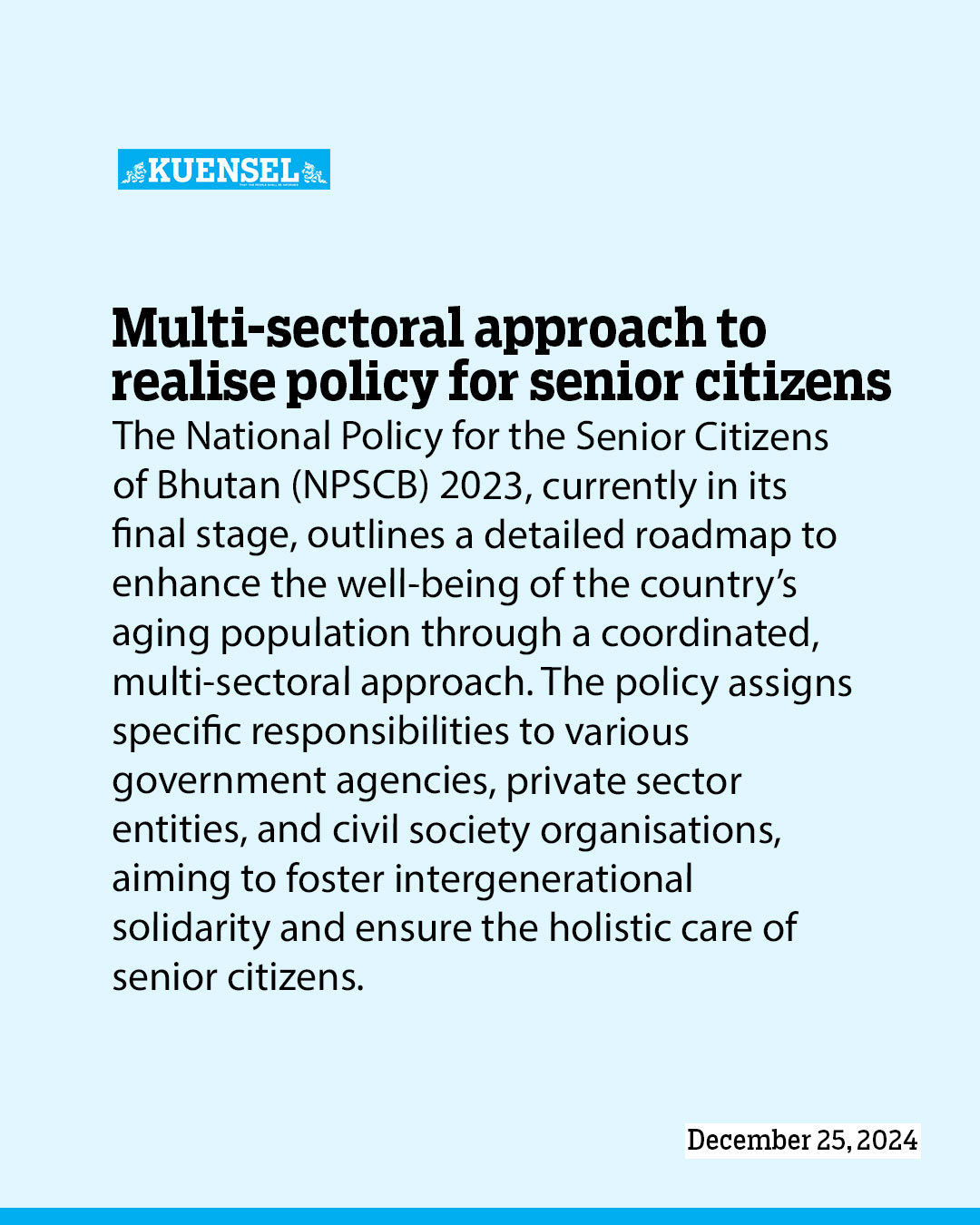Thinley Namgay
The National Policy for the Senior Citizens of Bhutan (NPSCB) 2023, currently in its final stage, outlines a detailed roadmap to enhance the well-being of the country’s aging population through a coordinated, multi-sectoral approach.
The policy assigns specific responsibilities to various government agencies, private sector entities, and civil society organisations, aiming to foster intergenerational solidarity and ensure the holistic care of senior citizens.
Two central institutions, the Office of Cabinet Affairs and Strategic Coordination (OCASC) and the Royal Society for Senior Citizens (RSSC), will oversee the policy’s implementation.
The OCASC will develop policy guidelines, coordinate with stakeholders, and evaluate outcomes to recommend necessary adjustments. The RSSC will spearhead service delivery, collaborate with non-governmental organizations, and ensure the effective execution of the policy’s provisions.
RSSC’s Executive Director Tshering Namgay said the policy was approved by the government and the action plan is in the stage of refining . “We just need to screen some activities in our action plan. Action plan development was also led by the Cabinet and I am optimistic about the policy.”
Tshering Namgay said all the activities in the action plan have been incorporated in consultation with relevant agencies and all have supported it. “Agencies have to abide by it and they have to be accountable. For the implementation of the policy, RSSC will monitor and do follow up.”
He said that all stakeholders were present since the first drafting of the policy and there should not be a question on implementation.
As per the policy, the home ministry is responsible for fostering traditions, culture, and family values to strengthen intergenerational bonds.
The education ministry is tasked to facilitate intergenerational activities in educational institutions and offer literacy and livelihood programmes for senior citizens through non-formal education initiatives.
To prioritise health care for senior citizens, the health ministry is bound to establish one-stop centers to deliver inclusive health services tailored to their needs.
For housing and infrastructure, the Ministry of Information and Transport and housing agencies are responsible for creating senior-friendly homes and accessible environments.
The GovTech is tasked to oversee age-sensitive representation in media, while the Ministry of Finance will allocate resources to support the policy’s initiatives.
Additionally, the Centre for Bhutan Studies and GNH Studies, alongside the National Statistical Bureau, will conduct research on issues affecting senior citizens to ensure evidence-based policymaking.
Religious institutions are entrusted with enhancing the spiritual and mental well-being of senior citizens, while local governments have the duty to appoint nodal officers to integrate the policy into their development plans and community programmes.
The policy encourages the private sector to develop innovative solutions such as age-friendly businesses and digital platforms while contributing to elderly care through Corporate Social Responsibility programmes, including the establishment of care homes and other services for the elderly.
Non-governmental organisations and civil society organisations will play a pivotal role in supporting persons with disabilities and other vulnerable groups under the framework of the Corporate Governance and Corporate Social Responsibility Code of Bhutan 2022.
To protect senior citizens from abuse and violence, the Royal Bhutan Police will ensure timely responses and thorough investigations into any reported crimes.


